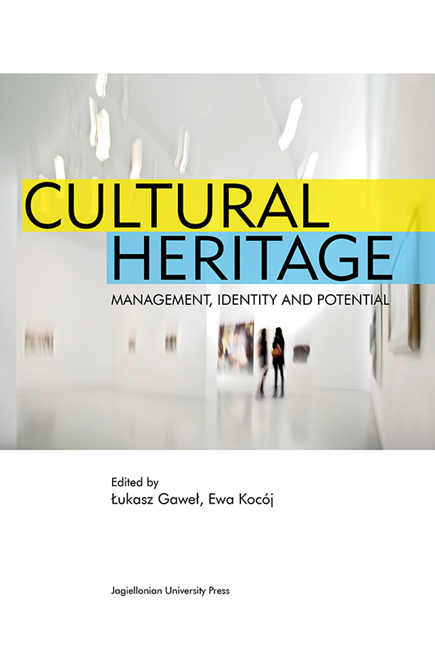Book contents
- Frontmatter
- Contents
- In Lieu of an Introduction
- Towards New Areas of Heritage and Cultural Heritage Management (Introduction)
- Pandora's Box or The Holy Grail? On Managing Cultural Heritage
- Cultural Heritage Within Postmodern Reality
- Legal Protection of Intangible Cultural Heritage. The Concept of the Safeguarding of Expressions of Folklore
- Cultural Heritage as a Shared Resource. The Role of Collaboration Between Stakeholders in Cultural Heritage Management
- Urban Exploring – City – Heritage – Identity
- The Thematisation of Public Space – a Problem or a Necessity?
- Memory for the Future. Managing History Within the Framework of Museums
- Historical Museums: Between Collective Memory and Politics of Historical Memory
- Between Ownness and Alienness: Towards the Dialectic of Cultural Heritage
Cultural Heritage Within Postmodern Reality
Published online by Cambridge University Press: 10 January 2018
- Frontmatter
- Contents
- In Lieu of an Introduction
- Towards New Areas of Heritage and Cultural Heritage Management (Introduction)
- Pandora's Box or The Holy Grail? On Managing Cultural Heritage
- Cultural Heritage Within Postmodern Reality
- Legal Protection of Intangible Cultural Heritage. The Concept of the Safeguarding of Expressions of Folklore
- Cultural Heritage as a Shared Resource. The Role of Collaboration Between Stakeholders in Cultural Heritage Management
- Urban Exploring – City – Heritage – Identity
- The Thematisation of Public Space – a Problem or a Necessity?
- Memory for the Future. Managing History Within the Framework of Museums
- Historical Museums: Between Collective Memory and Politics of Historical Memory
- Between Ownness and Alienness: Towards the Dialectic of Cultural Heritage
Summary
Abstract: This article tries to reconstruct possible issues could appear when the postmodern mode of interpretation is applied to the problem of cultural heritage. The problem is more complicated because the idea of cultural heritage is mostly founded on the humanistic management theory and this theory also tries to use postmodern tools but more generally. So it is impossible to consider connections between heritage and postmodernity in separation to the discipline of humanistic management. The solution lies in the universal characteristics of postmodernity, especially in its theory about the knowledge. Article refers this issue through the concepts by Jean-François Lyotard and Michel Foucault. These concepts underline relativeness and localness of the knowledge. The same attributes affect categories it uses like historicity, identity and even genuineness or humanity. In that case it is impossible to treat heritage as a simple order of succession, but rather as a local effect. But there is also a limit in this treatment which is constituted by the subject, the man, who ought to build his subjectivity against polyphonic and meaningless form of world. This also refine the fundamental bet between the heir and the testator much more important than the circular movement of goods within community which stands behind the modern form of cultural heritage.
Key words: cultural heritage, postmodernity, postmodernism, humanistic management
This article presents the issue of cultural heritage mainly in the general perspective of humanistic management. The research context allows the general perspective to emerge beyond the principal issues related to the studied sub- ject, i.e. specific context within which the heritage is placed, and an approach based on postmodern assumptions. It does emerge because postmodernity takes up the problem of scientific knowledge as such, i.e. it also tackles its individual domains. Hence, there is a double connection postmodernity has with the presented issue of cultural management: content-related, objective and epistemological, superior to it, which will inexorably comprise the background of the entire study.
The perspective of management based on achievements of humanistic sciences seems to be especially well chosen when the theme of cultural heritage is related to par exemple philosophical concept. However, the postmodern thought was also principally developed along the social and even political deliberation, and thus describes contemporary civilization together with its domains.
- Type
- Chapter
- Information
- Cultural Heritage - Management, Identity and Potential , pp. 29 - 40Publisher: Jagiellonian University PressPrint publication year: 2015



